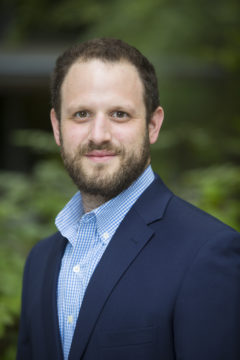SPIA’s Department of International Affairs has won a three-year grant from the Israel Institute, worth more than $230,000, to support courses and programming on modern Israel.
“The Israel Institute is a nonprofit dedicated to promoting the study of Israel in universities in the United States, supporting the field of Israel studies through grants, guest speakers, and teaching fellowships,” said SPIA Associate Professor of International Affairs Lihi Ben Shitrit, who was invited to apply for the grant based on a long-term relationship with the institute.
The grant will fund the hire of a scholar on modern Israel, Dr. Eli Sperling, currently a postdoctoral associate in the Duke University Department of Asian and Middle Eastern Studies. Sperling will be responsible for teaching four undergraduate-level courses and organizing at least four academic/community events per year.

Dr. Eli Sperling
Sperling, who has graduate degrees from Tel Aviv University and Ben-Gurion University and has held research and teaching positions at Duke and Emory University (Institute for the Study of Modern Israel), brings a wealth of experience on modern Israel. In Fall 2022, he will teach an overview course on Israeli politics as well as a class on the history, politics, and diplomacy of the Arab Israeli conflict, both novel course offerings at UGA. He and Ben Shitrit agree on the demand for these courses on today’s campus, referencing similar offerings at Emory and Duke University that routinely fill large classrooms.
“These courses generate such enrollment because students across fields, disciplines, and ideological spectrums are interested in getting scholarly analysis on these big, worldview-shaping topics, especially on campuses these days,” said Sperling. “I think, if built right, over a couple of years these could be courses that [attract] students across the university.”
The grant also requires programming on modern Israeli politics and culture, through events, speakers, and student groups. Sperling learned the value of such extra-curricular engagement from previous campus engagements; he listed Nachman Shai, the current Israeli Minister of Diaspora Affairs, as one such dynamic speaker.
“It is a huge asset having an actual politician speak with students,” said Sperling. “You can only reach so many students with courses; some want to engage and get a scholarly perspective, but don’t necessarily have time in their schedule or interest in taking a course. Programming is proven to be a very effective way to respond to things as they occur, and I am really glad it was written into the job.”
Sperling, an active musician currently writing a book manuscript on the role of Hebrew music in transnational Zionism, has plans in place for cultural programming as well.
“Most of my research is about the cultural implications of national movements and transnationalism,” he said. “I look at music and other issues that add color to these broader conversations.”
Ben Shitrit sees the award and Sperling’s tenure as an opportunity to build a formal network of Middle East programming at the University of Georgia, which currently lacks a department or center dedicated to the subject.
“I think Eli being here could be a great opportunity for us to start collaborating with other departments, like religion and history, and bring these Middle East scholars together to think about programming and strengthen and expand the field of Middle East studies at UGA,” she said.
In addition, Ben Shitrit is in the process of organizing a study abroad program in Israel and Palestine, and hopes that these course offerings and events will help attract and prepare potential students. Sperling found this component especially appealing.
“My entrée into Israel studies came about as a result of a year and a half of studying abroad in my undergraduate years, [including a trip through] Lebanon, Syria, and Jordan, Arabic language and musical study in Cairo, and then a year at Tel Aviv University,” he said. “I have often engaged with U.S. students who are preparing to travel to Israel, Palestine, and other parts of the Middle East, to give scholarly context, frameworks, and a host of perspectives.”
Both scholars consider the UGA Department of International Affairs to be well positioned to help fulfil the goals of the Israel Institute.
“It is rare to find a university as good and as full of talented students as UGA where such opportunities exist,” said Sperling. “The Israeli Institute seeds opportunities for Israel scholars to get in to these wonderful schools. In a field this small, these are amazing and unique opportunities.”
For more information on SPIA classes and events on modern Israel, email [email protected].

